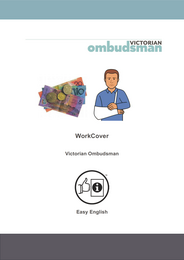Victoria’s WorkCover scheme is failing to deliver just outcomes for long term injured workers, inflicting a huge emotional toll on them, their families and wider society, Victorian Ombudsman Deborah Glass has found.
Ms Glass said WorkSafe agents – five commercial bodies who manage WorkCover claims on behalf of WorkSafe – are continuing to make unreasonable decisions, in some cases for financial incentives.
“The system is failing to deliver just outcomes to too many people. WorkSafe agents continue to make unreasonable decisions, the dispute process can be time consuming, stressful and costly, and WorkSafe is too often unwilling or unable to deal,” Ms Glass said.
Revisiting an issue she first investigated in 2016, Ms Glass has today tabled in the Victorian Parliament her 18-month long WorkSafe 2: Follow-up investigation into the management of complex workers compensation claims.
“I said in 2016 these cases involve people’s lives, and the human cost should never be forgotten; that human cost continues to this day,” Ms Glass said.
“From the evidence in this report it would appear that my 2016 investigation only scratched the surface. Many of the decisions and actions we saw were not only unjust and wrong. Some were downright immoral and unethical.”
Her investigation found evidence of agents:
- selectively using evidence to terminate a worker’s entitlements, even where the medical opinion relied on was unclear, contradictory or inconclusive
- conducting surveillance of workers without adequate, or any, evidence they were misrepresenting their injury
- requiring workers to attend occupational rehabilitation at inappropriate stages of their recoveries, and then issuing the workers with non-compliance notices if they failed to attend.
Ms Glass found that WorkSafe had failed to hold agents accountable for poor decisions, shirking from requiring agents to overturn decisions that had failed its own audits.
She said while her 2016 investigation had resulted in some improvements, it also appeared to have driven some practices underground.
“Agent staff were told to be careful what they put in writing – in case the Ombudsman sees it. Staff were advised to use words like ‘entitlement reviews’ in their emails rather than ‘termination’,” she said.
“But while this meant less overt evidence of decisions being made for financial incentives, this was the only logical explanation for some of them: agents who came to conciliation not prepared to conciliate beyond a derisory sum; maintaining those decisions knowing they would be overturned by a court, on the basis that many workers would simply give up.
“The financial viability of the scheme is imperative; but the balance between financial sustainability and fairness for injured workers has tilted too far away from the latter.” Ms Glass said. “It is time for the change that makes a difference, and I welcome the government’s acceptance of this.”
Ms Glass has made 15 recommendations to the Victorian Government and WorkSafe, all of which have been accepted.
The government has agreed to:
- commission an independent review of the agent model to determine whether they should continue to manage ‘complex claims’
- introduce a new dispute resolution process which allows for binding determinations if conciliation fails, sparing injured workers the cost and time of going to court. These processes already exist in other Australian states.
Facts and figures
The Ombudsman’s investigation reviewed 102 complex claims, looked into WorkSafe’s handling of about 50 complaints, interviewed witnesses across the scheme and obtained other evidence, including a sample of agent staff emails. Complex claims primarily involve workers who have not worked and have been receiving weekly payments for 130 weeks or more. At the end of 2017-18, there were 4,544 of these claims, making up about one quarter of the 18,519 active claims in the scheme.
Complex claims are the most difficult and expensive claims. The workers involved are likely to have more challenging health conditions. The majority of WorkCover claims are neither complex nor contentious.
In 2017-18, 70 per cent of decisions disputed at court were overturned or varied.
Source: Victorian Ombudsman, Australia

